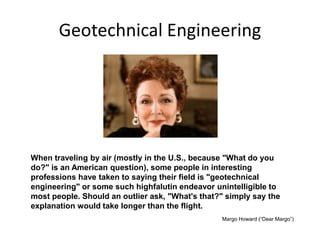The Definitive Guide to Geotheta
The Definitive Guide to Geotheta
Blog Article
Geotheta Things To Know Before You Buy
Table of Contents3 Simple Techniques For GeothetaAbout GeothetaThe 3-Minute Rule for GeothetaOur Geotheta StatementsThe 6-Second Trick For Geotheta

They perform website examinations, collect samples, do laboratory tests, and assess data to examine the viability of the ground for building projects - Consulting Engineers. Based on their findings, geotechnical engineers supply referrals for foundation design, incline security, retaining structures, and mitigation of geotechnical risks. They work together with various other specialists, such as designers, structural designers, and construction teams, to make sure that geotechnical factors to consider are incorporated right into the overall project style and application
By evaluating the actions and homes of dirt and rock, they can identify prospective geotechnical risks such as landslides, dirt settlement, or slope instability. Their experience aids avoid failures or crashes that might jeopardize lives and residential property. Below are some in-depth duties and obligations of a geotechnical engineer: Website Investigation: Geotechnical designers conduct site examinations to gather information on subsurface problems.
They analyze the information to comprehend the properties and habits of the soil and rock, including their stamina, leaks in the structure, compaction qualities, and groundwater problems. Geotechnical Evaluation and Design: Geotechnical engineers examine the information accumulated during website examinations to assess the security and suitability of the website for building tasks. They execute geotechnical computations and modeling to evaluate aspects such as bearing capacity, settlement, slope security, side planet pressures, and groundwater circulation.
Some Known Facts About Geotheta.
Foundation Design: Geotechnical designers play a vital duty in developing structures that can safely support the intended framework. They analyze the soil conditions and lots demands to determine the ideal foundation type, such as shallow structures (e.g., footings), deep structures (e.g (https://geotheta.jimdosite.com/)., heaps), or specialized methods like soil improvement. They think about elements such as negotiation limits, birthing capacity, and soil-structure interaction to develop optimum foundation layouts
They review construction plans, screen website activities, and perform field inspections to validate that the style suggestions are adhered to. If unanticipated geotechnical problems occur, they evaluate the situation and give referrals for remediation or modifications to the design. Risk Assessment and Reduction: Geotechnical engineers evaluate geotechnical risks and dangers connected with the task site, such as landslides, liquefaction, or soil disintegration.

Collaboration and Communication: Geotechnical designers work closely with other specialists involved in a task, such as engineers, architectural engineers, and construction groups. Effective interaction and cooperation are necessary to incorporate geotechnical factors to consider into the total task design and building process. Geotechnical designers provide technological proficiency, response inquiries, and ensure that geotechnical demands are fulfilled.
The 30-Second Trick For Geotheta
Right here are some types of geotechnical engineers: Foundation Engineer: Structure engineers specialize in developing and analyzing structures for structures. They evaluate the soil problems, load needs, investigate this site and site characteristics to identify the most suitable structure kind and layout, such as superficial structures, deep structures, or specialized methods like heap foundations.
They review the factors influencing incline security, such as dirt residential properties, groundwater problems, and incline geometry, and develop techniques to stop slope failures and minimize risks. Quake Engineer: Earthquake designers focus on evaluating and designing frameworks to withstand seismic pressures. They evaluate the seismic danger of a website, assess soil liquefaction possibility, and establish seismic style criteria to make sure the safety and security and strength of frameworks during earthquakes.
They execute area testing, accumulate samples, and evaluate the collected data to identify the soil buildings, geologic formations, and groundwater conditions at a site. Geotechnical Instrumentation Engineer: Geotechnical instrumentation engineers concentrate on tracking and measuring the behavior of dirt, rock, and structures. They set up and keep instrumentation systems that check factors such as dirt settlement, groundwater levels, slope activities, and structural variations to assess efficiency and supply very early cautions of prospective issues.
Geotheta - Truths
They conduct examinations such as triaxial tests, debt consolidation examinations, straight shear examinations, and permeability tests to gather data for geotechnical analysis and style. Geosynthetics Engineer: Geosynthetics designers specialize in the design and application of geosynthetic materials, such as geotextiles, geogrids, and geomembranes. They make use of these products to improve soil security, reinforce slopes, give water drainage options, and control erosion.
They have a tendency to be investigatory individuals, which indicates they're intellectual, introspective, and investigative. They are interested, methodical, logical, logical, and sensible. Some of them are also social, indicating they're kind, charitable, cooperative, client, caring, handy, empathetic, tactful, and friendly - Geotechnical Engineers.
In the office environment, geotechnical engineers utilize specialized software application tools to carry out calculations, develop styles, and examine data. They prepare records, testimonial task specifications, interact with customers and employee, and coordinate job activities. The workplace setting offers a conducive environment for research study, evaluation, and partnership with other experts associated with the task.
Indicators on Geotheta You Should Know
They frequently check out project sites to conduct website investigations, examine geotechnical problems, and gather information for analysis. These check outs involve traveling to different locations, occasionally in remote or challenging surfaces. Geotechnical engineers might carry out soil sampling, conduct examinations, and screen building activities to make certain that the geotechnical elements of the job are being implemented appropriately.
Geotechnical engineers likewise work in specialized geotechnical laboratories. In these centers, they conduct experiments, perform tests on dirt and rock samples, and analyze the engineering residential or commercial properties of the products. Geotechnical lab designers function thoroughly in these atmospheres, taking care of testing equipment, operating instruments, and taping information. They collaborate with other research laboratory staff to guarantee accurate and reputable screening results.
Report this page